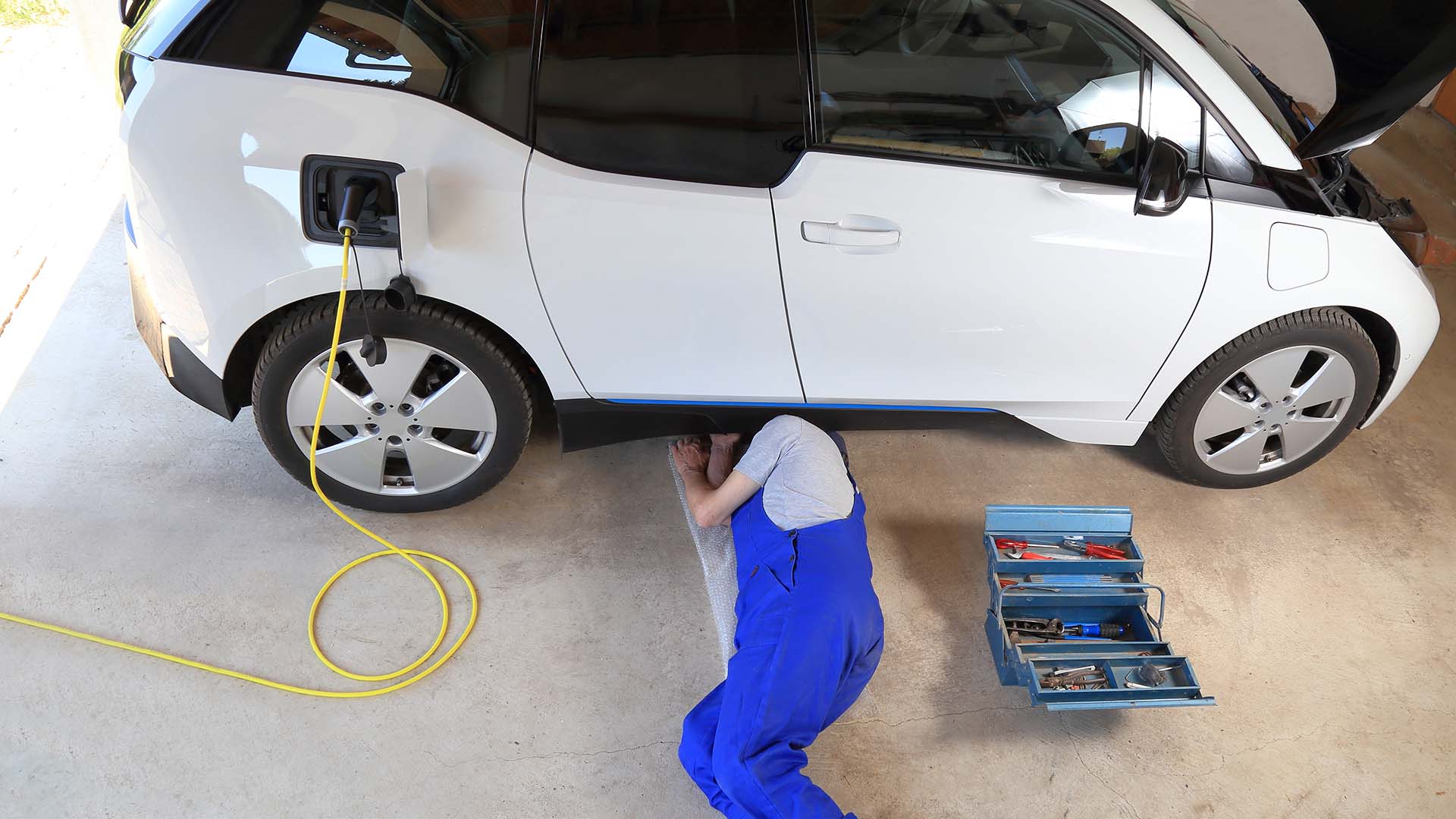Do Electric Cars Need Servicing and MOT?
We break down how EV servicing works, when MOTs are due, and how maintenance differs from petrol or diesel cars.

Do Electric Cars Need Servicing and an MOT?
EVs and hybrid cars have far fewer moving parts than regular petrol or diesel cars, so they need less maintenance. Since they don't have items such as spark plugs, fuel filters, exhaust systems, or engine oil, EVs undergo less wear and tear over time. This more straightforward setup requires fewer service checkups, is less expensive to maintain, and has fewer chances of large-scale breakdowns compared to gasoline engines.
But that doesn't mean they're maintenance-free. High-voltage battery systems, regenerative braking components, tyres, and onboard electronics all require ongoing servicing and care. Staying on top of your EV's servicing schedule is the key to a healthy battery, compliance with safety standards, and the long-term health of your electric motor.
Whether you're behind the wheel of a full electric vehicle or a plug-in hybrid, it's essential you know your way around your service plan, MOT laws, and the type of maintenance your vehicle needs. That way, you can keep it running like a gazelle and legally. In this guide, we'll examine what kind of servicing EVs need, how MOTs are carried out on electric vehicles, and what to expect from an average EV service.
Do Electric Cars Need Servicing Like Petrol or Diesel Cars?
Yes, electric vehicles still require some maintenance, but not in the same way as gasoline cars. ICE vehicles have complex engines with hundreds of moving parts, whereas electric motors are much simpler and cleaner. Due to this, EVs bypass a lot of the regular maintenance tasks you'd perform on petrol or diesel vehicles, such as oil changes, replacing spark plugs, or repairing the exhaust.
That said electric cars continue to have essential parts that you must check regularly, for example, tyres, brakes, suspension, and steering. Maintenance intervals can vary based on the manufacturer, but a safe bet is every 18,000 miles or annually.
What Maintenance Do Electric Cars Actually Need?
EV maintenance typically focuses on safety checks and component wear rather than engine tuning. Here are some common service items:
Brake pads and discs – Regenerative braking reduces wear, but brake components still need attention.
Tyres – EVs are heavier, meaning faster tyre wear.
Battery health – High-voltage battery checks are key to performance and longevity.
Software updates – Many EVs receive over-the-air updates, but some still require garage visits.
Cabin filters and fluid top-ups – Items such as washer fluid and cabin filters still require replacement.
Do Electric Cars Still Need an MOT?
Just like every other car you might see on UK roads, electric vehicles (EVs) require an MOT test when they are three years old. While pure electric cars are exempt from emissions tests since they have no tailpipe emissions, the rest of the MOT remains applicable. That means checking the brake pads and discs, tyres, lights, steering, suspension, and seatbelts to ensure the vehicle is roadworthy and ready to go.
Hybrid cars (those that combine an electric motor with a diesel or petrol engine) still require emissions testing for the MOT, unlike their all-electric counterparts. However, both electric and hybrid cars are examined using the same safety standards as regular internal combustion engine (ICE) vehicles.
Although EVs and hybrids have fewer moving parts, items such as regenerative braking systems, high-voltage batteries, and suspension still wear over time and need to comply with MOT requirements. Routine checks catch problems early, safeguarding your battery health and ensuring your vehicle's compliance.
It is worth noting that while some EV service packages include pre-MOT checks or reminders, it is your responsibility to get your car tested on time. Failure to get your MOT on time will incur penalties and also render your insurance invalid.
No matter if you own a Tesla, Nissan Leaf, or any other plug-in hybrid, an MOT remains an unavoidable part of having a road-legal vehicle in the UK, even for electric vehicles.
EV MOT Checklist – What’s Checked?
Here are the key areas assessed during an MOT for an electric car:
Lights and indicators
Brakes (even with regenerative braking)
Steering and suspension
Tyres and wheels
Windscreen and wipers
Seatbelts and mirrors
How Often Do EVs Need Servicing or MOTs?
Servicing schedules for electric vehicles can vary depending on the manufacturer. Most EVs follow a service interval of around every 18,000 miles or once a year, whichever comes first. MOTs are legally required every year after the car turns three years old, regardless of mileage.
Common EV Mot Failures
While EVs avoid emissions-related MOT failures, there are still common issues that can cause an electric car to fail its MOT. These are often linked to the same wear-and-tear areas found in all vehicles:
Tyre condition – Due to the extra weight of the battery, tyres on EVs can wear faster than expected. Bald or uneven tyres are a leading MOT failure.
Brake wear – Although regenerative braking reduces wear on pads and discs, they still require inspection and replacement if worn or corroded.
Suspension components – Heavier EVs can place more strain on suspension, increasing the likelihood of worn bushes or damaged springs.
Lights and indicators – As with any vehicle, faulty bulbs or non-functioning lights will result in a fail.
Wipers and washers – Inadequate screen wash levels or worn blades are easily fixed but commonly overlooked.
Registration plates and warning lights – Missing or unreadable number plates and illuminated dashboard warnings can also cause a failure.
Staying on top of your EV service schedule, checking wear items regularly, and preparing your car before its MOT date can help avoid these common failures and keep your electric car on the road.
Are Electric Cars Cheaper to Maintain?
Since electric vehicles (EVs) have fewer mechanical things happening and don't need oil changes, spark plug replacements, or exhaust checks, they're generally cheaper to maintain than conventional internal combustion engine (ICE) cars. And since there's less complicated mechanical business happening, EVs typically don't depreciate as fast, so you'll be in the shop less and pocket those maintenance savings. Electric motors are far more durable and efficient than combustion engines, requiring only a minimal amount of maintenance beyond standard check-ups. EVs entirely avoid emissions testing at MOTs and even save more money on maintenance for all-electric models. And with regenerative braking providing savings on brake pads and discs, they even last longer than petrol or diesel vehicles.
Where Can I Get an EV Serviced or MOT'd?
Hybrids and EVs need servicing at workshops with high-voltage systems and EV-specialist component skills. More workshops are now offering separate EV service plans, which can help to spread the cost and ensure your electric vehicle is well-maintained.
Keeping Your Electric Car Road-Ready
So, do electric cars need MOTs and servicing? Yes. Although they may need less servicing than petrol or diesel cars, servicing is still necessary to maintain your battery in peak health, guarantee safety, and protect the performance of your electric motor and critical components. Adhering to your service schedule and MOT routine guarantees that you can enjoy electric motoring to the full with confidence.
If you want to discover more about leasing an electric car with low service and maximum convenience, take a glance at our electric lease deals.
What's next?
Enjoyed this? Read our latest news

Business Lease Success for ECF
Ryan at ECF wanted a specific Audi e-Tron GT with options — and we were the only leasing company that could deliver it, under budget, with expert BIK guidance.
Mark's Dream Porsche Journey
Mark always wanted a Porsche. With our expert support, he found the perfect spec, landed a brilliant lease deal, and even hit the track at Silverstone.

The Best 6-Seat Cars in the UK
Whether it’s a big family, car shares or just needing extra room, 6-seaters are a smart sweet spot between a regular car and a full-on people carrier. Here are our favourites.
Customer Stories
We've helped over 1,000+ customers find their dream car, hear what they have to say.
Read more reviews“As usual, top class service. The team at Motorlet provided first class service from beginning to end with the friendly helpful expertise of Josh and Wendy. Will continue to use their services as I have done for the past six years...” Keep reading
Diane Parish | Audi Q5

New deals weekly
Subscribe to get the latest offers, guides, new, and more, straight to your inbox.


















